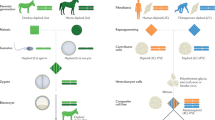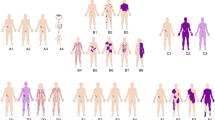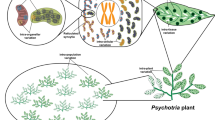Abstract
SOMATIC cell hybridisation can reveal complementation between genetic markers1, and interspecific hybridisation provides a means to study the mechanisms involved in complementation. When the phenotypes of both parental cells are distinguishable at the molecular level, two complementation mechanisms can be recognised2. When the allele contributed by the wild type parental cell overcomes the block in the biochemical pathway characteristic of the mutant parent, products characteristic of both species should be present in the hybrid. Alternatively, if either allele acts exclusively on its own pathway, that is the wild-type allele cannot act in trans, the blockage due to the mutation remains and only the wild-type product would be expected to be synthesised in the hybrid.
This is a preview of subscription content, access via your institution
Access options
Subscribe to this journal
Receive 51 print issues and online access
$199.00 per year
only $3.90 per issue
Buy this article
- Purchase on Springer Link
- Instant access to full article PDF
Prices may be subject to local taxes which are calculated during checkout
Similar content being viewed by others
References
Ruddle, F. H., in Somatic Cell Hybridization (edit. by Davidson, R. L. and dela Cruz, W. W.), 1–13 (Raven, New York, 1974).
Toniolo, D., and Basilico, C., Nature, 248, 411–413 (1974).
Toniolo, D., Meiss, H., and Basilico, C., Proc. natn. Acad. Sci. U.S.A., 70, 1273–1277 (1973).
Toniolo, D., and Basilico, C., Biochim. biophys. Acta. (in the press).
Croce, C. M., Girardi, A. J., and Koprowski, H., Proc. natn. Acad. Sci. U.S.A., 70, 3617–3620 (1973).
Croce, C. M., Koprowski, H., and Eagle, H., Proc. natn. Acad. Sci. U.S.A., 69, 1953–1956 (1972).
Littlefield, J. W., Science, 145, 709–710 (1964).
Seabright, M., Lancet, i, 971–972 (1971).
Croce, C. M., Litwack, G., and Koprowski, H., Proc. natn. Acad. Sci. U.S.A., 70, 1268–1272 (1973).
Eliceiri, G. L., and Green, H., Biochim. biophys. Acta, 199, 543–544 (1970).
van Heyningen, V., et al. in Gene Mapping 2 (edit. by Bergsma, D.), 183–187 (Karger, New York, 1975).
Gilbert, F., Kucherlapti, R., Creagan, R. P., Murnane, M. J., Darlington, G. J., and Ruddle, F. H., Proc. natn. Acad. Sci. U.S.A., 72, 263–267 (1975).
Perry, R. P., in Handbook of Molecular Cytology (edit. by Lima-de-Faria, S.), 621–636 (North Holland, Amsterdam, 1960).
Birnstiel, M. L., Chipcase, M., and Speirs, J., in Progress in Nucleic Acid Research and Molecular Biology (edit. by Davidson, J. N. and Cohn, W. E.), 351–389 (Academic, New York, 1971).
Kumar, A., and Warner, J. R., J. molec. Biol., 63, 233–246 (1972).
Eliceiri, G. L., and Green, H., J. molec. Biol., 41, 253–260 (1969).
Author information
Authors and Affiliations
Rights and permissions
About this article
Cite this article
TALAVERA, A., BASILICO, C. & CROCE, C. Imperfect complementation in human-hamster somatic cell hybrids. Nature 259, 667–670 (1976). https://doi.org/10.1038/259667a0
Received:
Accepted:
Issue Date:
DOI: https://doi.org/10.1038/259667a0
This article is cited by
-
Linkage of theleuS, emtB, andchr genes on chromosome 5 in humans and expression of human genes encoding protein synthetic components in human-Chinese hamster hybrids
Somatic Cell Genetics (1982)
-
Assignment of a human genetic locus to chromosome 5 which corrects the heat sensitive lesion associated with reduced leucyl-tRNA synthetase activity in ts025Cl Chinese hamster cells
Somatic Cell Genetics (1980)
-
Temperature sensitive defect in human-hamster cell hybrid
Nature (1976)
-
Temperature sensitive defect in human-hamster cell hybrid (reply)
Nature (1976)
Comments
By submitting a comment you agree to abide by our Terms and Community Guidelines. If you find something abusive or that does not comply with our terms or guidelines please flag it as inappropriate.



